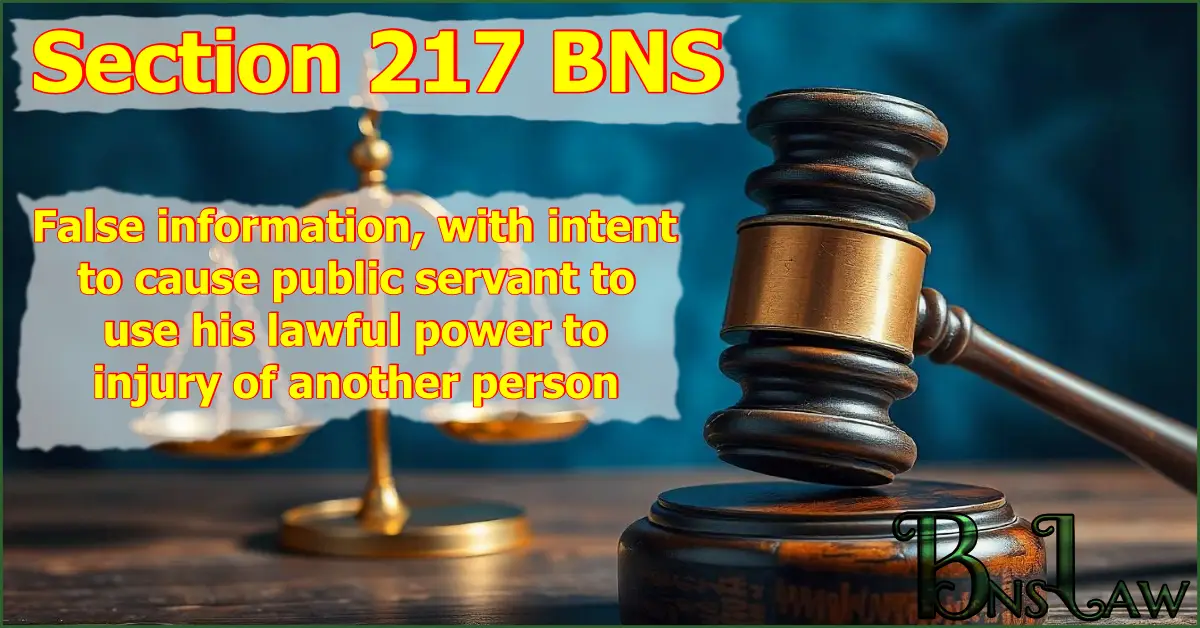Section 217 BNS | BNS 217 | BNS Section 217
Whoever gives to any public servant any information which he knows or believes to be false, intending thereby to cause, or knowing it to be likely that he will thereby cause, such public servant—
(a) to do or omit anything which such public servant ought not to do or omit if the true state of facts respecting which such information is given were known by him; or
(b) to use the lawful power of such public servant to the injury or annoyance of any person,
shall be punished with imprisonment of either description for a term which may extend to one year, or with fine which may extend to ten thousand rupees, or with both.
Illustrations
(a) A informs a Magistrate that Z, a police officer, subordinate to such Magistrate, has been guilty of neglect of duty or misconduct, knowing such information to be false, and knowing it to be likely that the information will cause the Magistrate to dismiss Z. A has committed the offence defined in this section.
(b) A falsely informs a public servant that Z has contraband salt in a secret place, knowing such information to be false, and knowing that it is likely that the consequence of the information will be a search of Z’s premises, attended with annoyance to Z. A has committed the offence defined in this section.
(c) A falsely informs a policeman that he has been assaulted and robbed in the neighbourhood of a particular village. He does not mention the name of any person as one of his assailants, but knows it to be likely that in consequence of this information the police will make enquiries and institute searches in the village to the annoyance of the villagers or some of them. A has committed an offence under this section.
READ OTHER SECTIONS OF CHAPTER XIII — OF CONTEMPTS OF THE LAWFUL AUTHORITY OF PUBLIC SERVANTS
FAQs of BNS Section 217
-
217 BNS punishment and fine
Punishment and fine under Section 217 of the BNS: Imprisonment for 1 year, or with fine of 10,000 rupees, or both.
-
217 BNS cognizable or not
The offence under Section 217 of the BNS is non-cognizable.
-
217 BNS bailable or not
The offence under Section 217 of the BNS is bailable.
-
217 BNS trial court
Offence specified in Section 217 of the BNS is triable by any Magistrate.
Important Points
- Cognizable Offences: These are offences where a police officer can arrest a person without a warrant.
- Non-Cognizable Offences: These are offences where a police officer cannot arrest a person without a warrant.
- Bailable Offences: These are offences where the accused can get bail from the police station itself. All bailable offences are listed in the First Schedule of the Bharatiya Nagarik Suraksha Sanhita (BNSS).
- Non-Bailable Offences: Offences in which bail is not granted directly from the police station but after hearing the case in the court, the judge decides when bail will be granted. All non-bailable offences are listed in the first schedule of the Bharatiya Nagarik Suraksha Sanhita (BNSS).
- In the above FAQ, “trial court” means the court that has jurisdiction to try the offence.
- In the above FAQ, the expression “Magistrate of the first class” and “Any Magistrate” does not include Executive Magistrates.
Read other Sections of the BNS
Reference Link: New Criminal Laws (BNS), Ministry of Home Affairs







